- Clone
- B6 (See other available formats)
- Regulatory Status
- RUO
- Other Names
- T cell receptor V δ 2, TRDV2, TCRDV102S1
- Isotype
- Mouse IgG1, κ
- Ave. Rating
- Submit a Review
- Product Citations
- publications
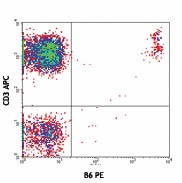
-

Human peripheral blood lymphocytes stained with CD3 (UCHT1) APC and B6 PE
| Cat # | Size | Price | Quantity Check Availability | Save | ||
|---|---|---|---|---|---|---|
| 331407 | 25 tests | 98€ | ||||
| 331408 | 100 tests | 215€ | ||||
The Vδ2 TCR is a variant of the TCR δ chain expressed on a subset of γ/δ T cells. Vγ9Vδ2 T lymphocytes, a major γ/δ T cell subset in humans, recognize phosphoantigens, certain tumor cells, and cells treated with aminobisphosphonates. This cell population displays cytolytic activity against various tumor cells. The γ/δ TCR is an heterodimeric TCR complex composed of covalently bound γ and δ chains involved in antigen recognition and the non-covalently associated monomorphic proteins CD3δ, γ, ε, and ζ chains.
Product DetailsProduct Details
- Verified Reactivity
- Human
- Reported Reactivity
- Chimpanzee
- Antibody Type
- Monoclonal
- Host Species
- Mouse
- Formulation
- Phosphate-buffered solution, pH 7.2, containing 0.09% sodium azide and BSA (origin USA)
- Preparation
- The antibody was purified by affinity chromatography, and conjugated with PE under optimal conditions.
- Concentration
- Lot-specific (to obtain lot-specific concentration and expiration, please enter the lot number in our Certificate of Analysis online tool.)
- Storage & Handling
- The antibody solution should be stored undiluted between 2°C and 8°C, and protected from prolonged exposure to light. Do not freeze.
- Application
-
FC - Quality tested
- Recommended Usage
-
Each lot of this antibody is quality control tested by immunofluorescent staining with flow cytometric analysis. For flow cytometric staining, the suggested use of this reagent is 5 µl per million cells in 100 µl staining volume or 5 µl per 100 µl of whole blood.
- Excitation Laser
-
Blue Laser (488 nm)
Green Laser (532 nm)/Yellow-Green Laser (561 nm)
-
Application References
(PubMed link indicates BioLegend citation) -
- Rojas RE, et al. 2005. J. Infect. Dis. 192:1806.
- Correia DV, et al. 2011. Blood 118:992. (FC) PubMed
- Product Citations
-
- RRID
-
AB_1089233 (BioLegend Cat. No. 331407)
AB_1089233 (BioLegend Cat. No. 331408)
Antigen Details
- Structure
- Ig superfamily member, TCR γ/δ with CD3 forms the CD3/TCR complex
- Distribution
-
Expressed on majority of peripheral γ/δT cells
- Function
- Antigen recognition, T cell activation
- Ligand/Receptor
- Peptide bound to MHC
- Cell Type
- T cells
- Biology Area
- Adaptive Immunity, Immunology
- Molecular Family
- TCRs
- Antigen References
-
1. Scotet E, et al. 2005. Immunity 22:71.
2. Rincon-Orozco B, et al. 2005. J. Immunol. 175:2144. - Gene ID
- 6964 View all products for this Gene ID
- Specificity (DOES NOT SHOW ON TDS):
- TCR Vdelta2
- Specificity Alt (DOES NOT SHOW ON TDS):
- TCR Vδ2
- App Abbreviation (DOES NOT SHOW ON TDS):
- FC
- UniProt
- View information about TCR Vdelta2 on UniProt.org
Related Pages & Pathways
Pages
Related FAQs
- What type of PE do you use in your conjugates?
- We use R-PE in our conjugates.
Other Formats
View All TCR Vδ2 Reagents Request Custom ConjugationCustomers Also Purchased
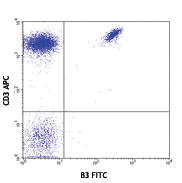
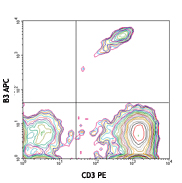
Compare Data Across All Formats
This data display is provided for general comparisons between formats.
Your actual data may vary due to variations in samples, target cells, instruments and their settings, staining conditions, and other factors.
If you need assistance with selecting the best format contact our expert technical support team.
-
Purified anti-human TCR Vδ2
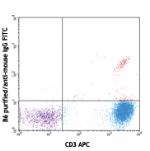
Human peripheral blood lymphocytes stained with purified B6,... -
Biotin anti-human TCR Vδ2
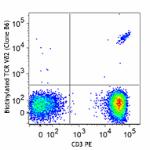
Human peripheral blood lymphocytes were stained with CD3 APC... 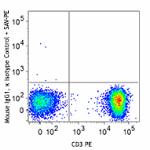
-
FITC anti-human TCR Vδ2
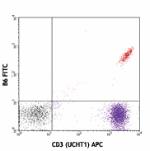
Human peripheral blood lymphocytes stained with CD3 (UCHT1) ... -
PE anti-human TCR Vδ2
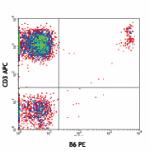
Human peripheral blood lymphocytes stained with CD3 (UCHT1) ... -
PerCP anti-human TCR Vδ2
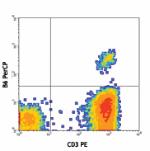
Human peripheral blood lymphocytes stained with CD3 PE and B... 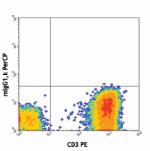
-
Brilliant Violet 711™ anti-human TCR Vδ2
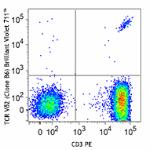
Human peripheral blood lymphocytes were stained with CD3 PE ... 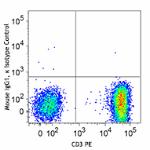
-
Pacific Blue™ anti-human TCR Vδ2
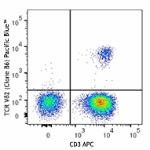
Human peripheral blood lymphocytes were stained with CD3 APC... 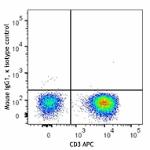
-
Alexa Fluor® 700 anti-human TCR Vδ2
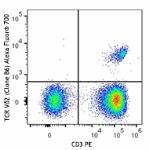
Human peripheral blood lymphocytes were stained with CD3 PE ... 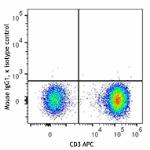
-
PerCP/Cyanine5.5 anti-human TCR Vδ2

Human peripheral blood lymphocytes were stained with CD3 APC... -
APC anti-human TCR Vδ2
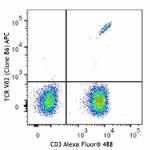
Human peripheral blood lymphocytes were stained with CD3 Ale... 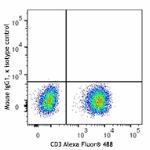
-
PE/Cyanine7 anti-human TCR Vδ2

Human peripheral blood lymphocytes were stained with CD3 APC... -
APC/Fire™ 750 anti-human TCR Vδ2
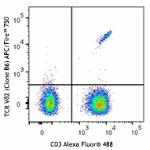
Human peripheral blood lymphocytes were stained with CD3 Ale... 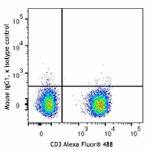
-
Brilliant Violet 421™ anti-human TCR Vδ2

Human peripheral blood lymphocytes were stained with CD3 APC... -
Brilliant Violet 605™ anti-human TCR Vδ2

Human peripheral blood lymphocytes were stained with CD3 APC... -
PE/Dazzle™ 594 anti-human TCR Vδ2

Human peripheral blood lymphocytes were stained with CD3 APC... -
Brilliant Violet 510™ anti-human TCR Vδ2

Human peripheral blood lymphocytes were stained with CD3 APC... -
TotalSeq™-A0582 anti-human TCR Vδ2
-
TotalSeq™-C0582 anti-human TCR Vδ2
-
TotalSeq™-B0582 anti-human TCR Vδ2
-
APC/Cyanine7 anti-human TCR Vδ2

Human peripheral blood mononuclear cells were stained with C... -
Spark Red™ 718 anti-human TCR Vδ2 (Flexi-Fluor™)
-
Spark Blue™ 574 anti-human TCR Vδ2 (Flexi-Fluor™)
-
Spark Blue™ 550 anti-human TCR Vδ2 (Flexi-Fluor™)
 Login / Register
Login / Register 









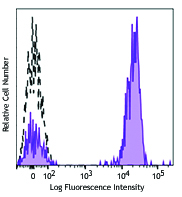
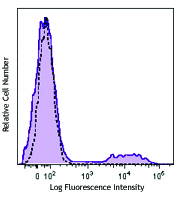



Follow Us